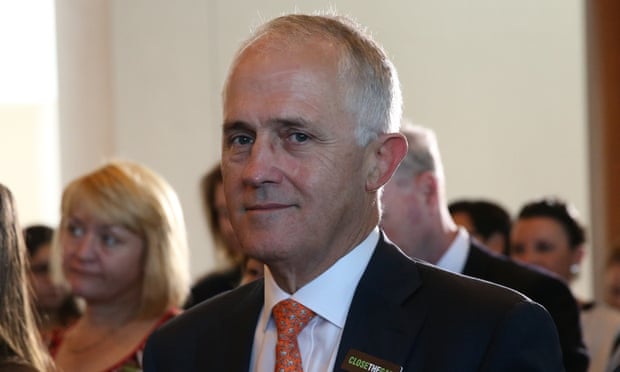Gabrielle Chan Tuesday 17 February 2015
On Q&A the potential challenger for the Liberal leadership pointedly distanced himself from Abbott, without directly criticising
Malcolm Turnbull Photograph: Mike Bowers for the Guardian
The hardest thing Malcolm Turnbull had to do on the ABC’s Q&A was to resist smiling too much.
It was meant to be a sporadic appearance on behalf of a government that just happens to be in spot of difficulty.
In fact, for most of the audience and no doubt his own party room, it became an audition for Tony Abbott’s job.
It was the pitch that the communications minister was not allowed to give a week ago when a leadership spill motion was defeated in Abbott’s favour by 61 votes to 39.
Turnbull’s fellow panellist Greg Sheridan, an old university friend of Abbott’s and foreign editor of the Australian, said it in plain language.
“I think Tony has a 50-50 chance of staying as leader,” Sheridan said. “If he were to lose support definitively, it is very likely the party would ask Malcolm Turnbull to take the leadership. That’s what I think.”
A former party leader who was knocked off by Abbott in 2009, Turnbull’s performance was a study in contrasts. A contrast with the incumbent and a contrast with his old self. The corporate raider who took the leadership too soon. The arrogant Malcolm who acted as chief executive rather than consensus builder.
It began with a rather clunky appeal to the Indonesian president, Joko Widodo, not to go ahead with the planned executions of the drug smugglers Andrew Chan and Myuran Sukumaran. Turnbull delivered his lines straight down the barrel of the camera.
“It is not a sign of weakness to spare the lives of these men,” he said. “Yes, they have committed very terrible crimes. Yes, they knew that the death penalty was there if they were caught and found guilty. But it is not weak to spare their lives. It is a sign of the strongest love, the greatest mercy when you extend it to those who least deserve it.”
The questions moved on to Abbott’s decision to dump his chief whip Philip Ruddock. As other leadership contenders Julie Bishop and Scott Morrison have done, Turnbull stepped politely away from the scene of the crime.
“[Abbott] is the one who has to explain it, but I just want to say I think Philip Ruddock is a great Liberal, a great parliamentarian and it was a very sad day for all of us when we learnt his services as chief whip had been terminated by the prime minister,” Turnbull said.
“He is the boss. He is the captain. He can make a captain’s call.”
On children in detention, Turnbull again offered a contrast by refusing to criticise the human rights commissioner Gillian Triggs. Where Abbott attacked her report and said the commission ought to be ashamed of itself, Turnbull said Triggs was a legal academic with “a distinguished career”. The real issue was the children. There had been none in detention when John Howard lost office, 2,000 under Labor and by immigration minister Peter Dutton’s latest numbers – though there was disagreement over the final figure – 136 in detention as of Monday.
On the budget, Turnbull provided the mea culpa that Abbott had not, by conceding that the government had made mistakes both in its conversation with voters and with the budget measures themselves.
First, he said, the Coalition had not properly explained the nature of the budget problem - that government was spending $2 for every $1 of revenue raised.
Second, there was a problem on the “distributional side”. That is, one section of the population may be bearing more pain than others.
The F-word – fairness – was never mentioned but, in typical Turnbull style, the Athenian lawmaker Solon did get a run (and briefly trended on Twitter).
“When Solon was asked ‘Are these laws the best laws?’, the lawmaker replied: ‘They are the best laws the Athenians will accept.’
“You have to get your laws through,” Turnbull said.
But it was in the final moments of the show that Turnbull finally warmed to the part, when he was asked what could be done to restore the public’s faith in politics. The nub of his pitch left no one in any doubt as to Abbott’s shortcomings as leader.
“Australian political contests are won or lost at the sensible centre.”
(Abbott has moved too far to the right for Turnbull’s tastes.)
“This is a great nation and we are a good people and we are above all a sensible people. We recognise there are strong arguments on either side but what we as politicians have to do is treat the people with respect. Don’t slogan at them.”
(Abbott’s 2013 election pitch: stop the boats, end the waste, remove the carbon tax, build the roads of the 21st century.)
“Don’t pretend problems don’t exist … Explain what the problem is as clearly and concisely as you can… then have a debate about the options ... Sometimes politicians think they’re reaching out to the electorate by dumbing everything down. I think that disrespects the electorate.
(Abbott: “No cuts to education, no cuts to health, no change to pensions, no change to the GST and no cuts to the ABC or SBS.”)
“We have got to be much better at explaining the problems, because once you’ve explained the problem, people will accept the need for a solution and then you’ll have a competition about what the right solution is.”
In Malcolm’s mind, the solution is clearly not Tony.

EmoticonEmoticon